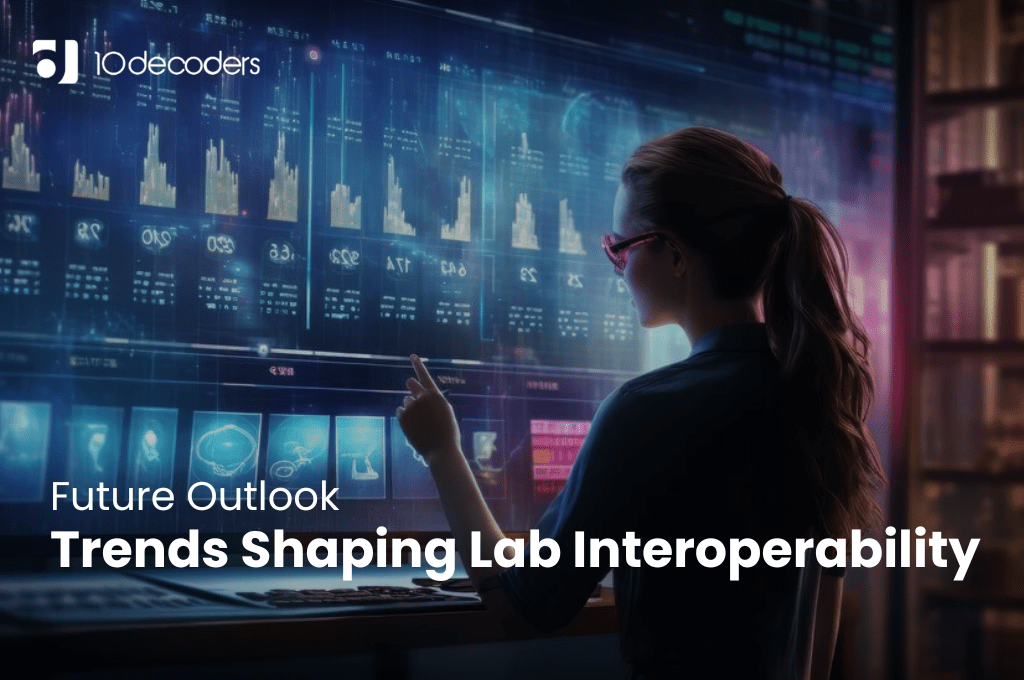Future Outlook: Trends Shaping Lab Interoperability
The research landscape is evolving at a rapid pace, fueled by an explosion of data and the increasing reliance on sophisticated experimental techniques. Laboratories, once isolated entities, are now interconnected hubs of knowledge exchange, demanding seamless interoperability between instruments, workflows, and data analysis pipelines. This blog delves into the key trends shaping the future of lab interoperability and data management, highlighting the challenges and opportunities that lie ahead.
1. Standardisation: The Bedrock of Interoperability
Data silos and incompatible software ecosystems hinder the efficient flow of information within and between laboratories. The scientific community is actively addressing this fragmentation through standardisation initiatives. Open-source data formats like HDF5 and netCDF, combined with standardised communication protocols like RESTful APIs, are laying the foundation for data exchange across diverse instrument brands and software platforms. The adoption of standardised ontologies for describing experimental metadata further facilitates data discoverability and reuse.
2. Cloud-Based Laboratories: Embracing Agility and Collaboration
On-premise data storage infrastructure faces scalability and accessibility limitations. Cloud computing offers a compelling alternative, enabling efficient data storage, remote access, and collaborative analysis environments. Cloud-based platforms like AWS and Microsoft Azure provide access to cutting-edge hardware and software resources, democratising access to sophisticated research tools for geographically dispersed teams. The integration of laboratory equipment with cloud platforms, facilitated by the Internet of Things (IoT), promises real-time data acquisition, remote monitoring, and automated experiment execution.
3. Artificial Intelligence and Machine Learning: Redefining Data Analysis
The sheer volume and complexity of scientific data necessitates intelligent tools for analysis and interpretation. Artificial intelligence (AI) and machine learning (ML) algorithms are transforming the way scientists extract insights from their data. Advanced algorithms can automate tedious data processing tasks, identify hidden patterns and correlations, and even design and refine experimental workflows. The integration of AI with laboratory instruments opens the door to real-time feedback and adaptive experimentation, enabling researchers to optimise their experiments on the fly.
4. Blockchain Technology: Ensuring Data Security and Provenance
Scientific data integrity is paramount, and blockchain technology offers a promising solution for ensuring data security and provenance. Blockchain-based platforms can create tamper-proof records of data generation, analysis, and sharing, fostering trust and collaboration across research teams. Additionally, blockchain can facilitate secure data monetization and incentivize data sharing, accelerating scientific progress.
5. Ethical Considerations: Balancing Openness with Privacy
While data sharing is crucial for scientific advancement, it raises ethical concerns regarding privacy and intellectual property. Striking a balance between open data and responsible data stewardship is critical. Secure access control mechanisms, anonymization techniques, and data use agreements are essential for ensuring research adheres to ethical and legal frameworks.
Challenges and Opportunities
The road to achieving seamless lab interoperability is not without its challenges. Infrastructure upgrades, cultural shifts towards open data practices, and ensuring data security and privacy all present significant hurdles. However, the potential rewards are vast. Enhanced data accessibility, collaboration, and analysis capabilities promise to accelerate scientific discovery, optimise resource utilisation, and ultimately transform the landscape of research.
Challenges
- Infrastructure Integration: Upgrading legacy systems and integrating diverse platforms can be expensive and time-consuming, requiring clear strategies and resource allocation.
- Data Standardization and Quality: Ensuring consistent data formats across instruments and laboratories remains a challenge, demanding rigorous data governance and quality control practices.
- Cybersecurity and Privacy: Robust security measures and ethical data governance frameworks are crucial to mitigate data breaches and uphold participant privacy, requiring ongoing vigilance and adaptation.
- Changing Culture and Mindsets: Embracing open data practices and collaborative workflows may require cultural shifts within labs, necessitating effective communication and training programs.
Opportunities
- Accelerated Scientific Discovery: Efficient data sharing and analysis can lead to faster breakthroughs in medicine, materials science, and other fields, paving the way for innovative solutions to global challenges.
- Reduced Costs and Improved Efficiency: Interoperable platforms can optimise resource utilisation, reducing redundancy and streamlining research processes, ultimately leading to cost savings and increased efficiency.
- Personalized Medicine and Precision Healthcare: Integrating patient data with lab data unlocks the potential for personalised medicine, tailoring treatments and interventions to individual needs, improving healthcare outcomes.
- Empowerment of Researchers: Cloud-based tools and shared datasets can democratise research and empower researchers in resource-limited settings, fostering global collaboration and accelerating scientific progress.
These challenges and opportunities highlight the crucial role of collaboration and innovation in realizing the full potential of lab interoperability. By working together, the scientific community can overcome the hurdles and unlock a future where data fuels discovery, empowers researchers, and ultimately benefits humanity.
Conclusion: A Positive yet Realistic Outlook
The future of lab interoperability is brimming with possibilities. By embracing standardisation, cloud-based technologies, AI-powered tools, and ethical data governance practices, the scientific community can unlock the full potential of its collective data and propel research forward at an unprecedented pace. The road ahead will undoubtedly require collaboration, innovation, and a willingness to adapt, but the future of scientific research appears to be one of interconnected laboratories, seamless data exchange, and an accelerated pace of discovery.



